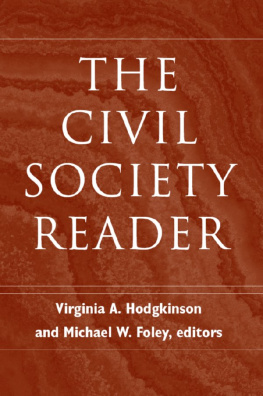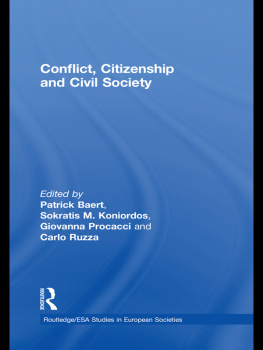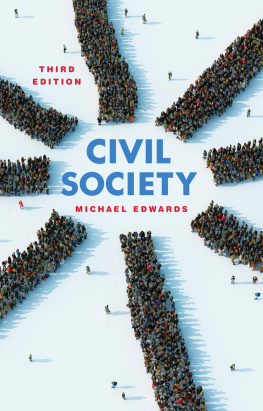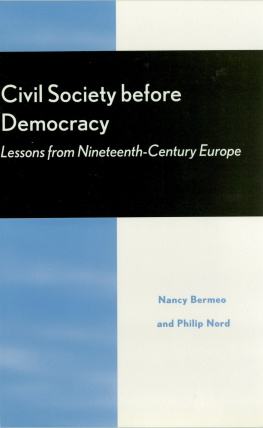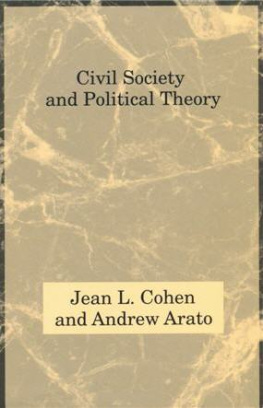The Civil Society Reader
Edited by
Virginia A. Hodgkinson
and Michael W. Foley
Tufts University Press
Published by University Press of New England
Hanover and London
Tufts University
Published by University Press of New England,
37 Lafayette St., Lebanon, NH 03766
2003 by Trustees of Tufts University
All rights reserved
Library of Congress Cataloging-in-Publication Data
The civil society reader / edited by Virginia A. Hodgkinson and Michael W. Foley.
p. cm. (Civil society)
Includes bibliographical references and index.
ISBN 978-1-58465-831-3 (pbk. : alk. paper)
1. Civil societyHistory. 2. Political scienceHistory.
I. Hodgkinson, Virginia Ann. II. Foley, Michael W. III. Series.
JC337 .C58 2002
300dc21 2002014986
The publisher gratefully acknowledges the following:
Chapter one, The Politics, is excerpted from Barnes, Jonathan; THE COMPLETE WORKS OF ARISTOTLE. Copyright 1984 by Princeton University Press. Reprinted by permission of Princeton University Press.
Chapters two and three, Ideas for a Universal History with a Cosmopolitan Purpose and Perpetual Peace, are from Immanuel Kant, Political Writings, ed. Hans S. Reiss, trans. H. B. Nisbet. Copyright Cambridge University Press 1970, 1991. Reprinted with the permission of Cambridge University Press.
Chapter four, An Essay on the History of the Civil Society, is excerpted from Adam Ferguson, An Essay on the History of Civil Society, ed. Fania Oz-Satzberger. Copyright 1995. Reprinted with the permission of Cambridge University Press.
Chapter seven, Philosophy of Right, is excerpted from G. W. F. Hegel, Philosophy of Right, translated with notes by T. M. Knox (1942). Reprinted by permission of Oxford University Press.
Chapter eight, On the Jewish Question, from THE MARX-ENGELS READER, SECOND EDITION by Robert C. Tucker. Copyright 1978, 1972 by W. W. Norton & Company, Inc. Used by permission of W. W. Norton & Company, Inc.
Chapter nine, Democracy in America, is from DEMOCRACY IN AMERICA by Alexis DeTocqueville, translated by Henry Reeve, copyright 1945 and renewed 1973 by Alfred A. Knopf, a division of Random House, Inc. Used by permission of Alfred A. Knopf, a division of Random House, Inc.
Chapter ten, The Public and Its Problems, is excerpted from The Collected Works of John Dewey, Later Works: Volume 2 The Public and Its Problems 1984 by the Board of Trustees, Southern Illinois University, reprinted by permission.
Chapter fourteen, A New Evolutionism 1976, is excerpted from Adam Michnik, Letters from Prison and Other Essays, translated/edited by Maya Latynski, pages 135154. Copyright 1985 The Regents of the University of California. Used by permission of University of California Press.
Chapter fifteen, To Empower People, is excerpted from Peter L. Berger and Richard John Neuhaus, To Empower People: The Role of Mediating. Reprinted with the permission of The American Enterprise Institute for Public Policy Research, Washington, D.C.
Chapter sixteen, Strong Democracy: Participatory Politics for a New Age, is excerpted from Benjamin Barber, Strong Democracy: Participatory Politics for a New Age, pages 213237. Copyright 1984 The Regents of the University of California. Used by permission of University of California Press.
Chapter eighteen, Civil Society and Political Theory, is excerpted from Jean L. Cohen and Andrew Arato, Civil Society and Political Theory. Copyright 1992 Massachusetts Institute of Technology. Used by permission of the MIT Press.
Chapter twenty-one, Making Democracy Work, is excerpted from Putnam, Robert D. MAKING DEMOCRACY WORK: CIVIC TRADITIONS IN MODERN ITALY. Copyright 1993 by Princeton University Press. Reprinted by permission of Princeton University Press.
Chapter twenty-two, Habits of the Heart, is excerpted from Robert N. Bellah, et al., Habits of the Heart: Individualism and Commitment in American Life, pages viixiii, xvxvii, and xxixxxv of the introduction. Copyright 1985, 1996 Regents of the University of California. Used by permission of University of California Press.
For additional credits, see Sources on page .
Civil Society: Historical and Contemporary Perspectives
Series Editors:
VIRGINIA HODGKINSON
Public Policy Institute, Georgetown University
KENT E. PORTNEY
Department of Political Science, Tufts University
JOHN C. SCHNEIDER
Department of History, Tufts University
BRIAN OCONNELL
Civil Society: The Underpinnings of American Democracy
PHILIP H. ROUND
By Nature and by Custom Cursed: Transatlantic Civil Discourse and New England Cultural Production, 16201660
BOB EDWARDS, MICHAEL W. FOLEY, AND MARIO DIANI, EDS.
Beyond Toqueville: Civil Society and the Social Capital Debate in Comparative Perspective
KEN THOMSON
From Neighborhood to Nation: The Democratic Foundations of Civil Society
HENRY MILNER
Civic Literacy: How Informed Citizens Make Democracy Work
VIRGINIA A. HODGKINSON AND MICHAEL W. FOLEY, EDS.
The Civil Society Reader
Introduction
Michael W. Foley and Virginia A. Hodgkinson
The notion of civil society is more than just the vague but often powerful slogan of the last several years. The term has a distinguished pedigree in Western efforts to grapple with fundamental problems in the shape and direction of modern societies. Yet thinkers over the last two hundred years have held competing visions of what civil society is and what it means for our lives in common. This collection of readings attempts to convey the richness of the civil society tradition and debate. The following pages propose a framework for understanding the contending positions in the civil society debate.
In the broadest terms, the civil society debate is about the conditions of citizenship and the character of the good societyabout what shapes citizens and contributes to civic virtue and civic engagement, about what role the ordinary occupations and preoccupations of citizens play in the public sphere and in building the good society, about the function and place of the associations that make up modern societies in the polities that attempt to govern them. In that sense, the debate can be traced back as far as Plato and Aristotle, with the latter arguing against his mentor that the good society was one in which human nature reached its perfection through the practice of the arts of civic responsibility. The political order, the polis, was the association of associations in Aristotles eyes, and only by sharing in ruling and being ruled could human beings achieve genuinely human virtue. Aristotle was as concerned with the nature of the best sort of political system, and its relations to the elements of society that made it up, as with civic virtue. Indeed, in his conception the two went hand in hand.
The authors assembled in this volume thus reflect varying sides of a debate that stretches back through all of Western history. We start with some passages from Aristotles Politics in recognition of his role even in contemporary discussions. Nevertheless, if the larger questions reflected here are perennial, the civil society debate poses them in the specific context of modernity, with its seemingly sharp distinction between the modern, bureaucratic state and a complex society built on the division of labor and increasing acknowledgment of difference among its citizens. The volumes real engagement with the idea of civil society thus starts with two thinkers of the Enlightenment, Immanuel Kant and Adam Ferguson, because the modern notion of civil society was born in the late eighteenth century, at the dawn of the modern condition.

